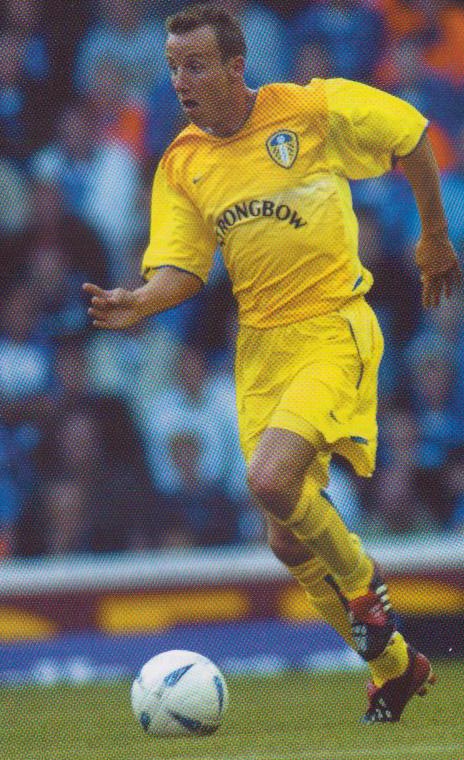

Bowyer: Lee David (Lee)
1996-2003
(Leeds Player Details)(Player Details)
Central Midfield
Born: Canning Town, London: 03-01-1977
Debut v Derby County (a): 17-08-1996
5’9” 9st 11lb (2005)
#25 in 100 Greatest LUFC Players Ever

After playing with Senrab FC, Bowyer achieved the childhood dream of many young boys and
signed, aged seventeen, for a football club. But the deal was with First Division Charlton
Athletic, rather than his beloved West Ham United. He was an outstanding prospect with many
fine performances alerting the “bigger Clubs” to his potential. He had scored eight goals
in forty-six League games and fourteen in fifty seven starts and one game from the bench,
in all matches when he moved from Charlton to Leeds United for £2.8m, in July 1996,then a
record for a British teenager. Bowyer's initial progress at Elland Road was curtailed with
the signing of two other all-action midfielders, David Hopkin and Alf Inge Haaland. He
eventually supplanted Hopkin in the side and in 1998/99 he was named Leeds' Player of the
Season after plundering nine League goals. He later matured into an excellent all-round
midfielder. Bowyer was a key figure as Leeds finished in third place in the 1999/2000
Premiership table and was nominated for the PFA Young Player of the Year award. A
fiercely-competitive midfielder, Bowyer had been at the peak of his playing powers, despite
being under intense scrutiny. He remained focused enough to play in all Leeds' Premiership
matches in the 2000-01 season, and he was also the joint leading scorer in the Champions
League, with goals against continental giants AC Milan, Barcelona and Lazio. He continued
in the same vein in the 2001-02 season, with a string of commanding performances in a Leeds
team that was doing well on both the domestic and European fronts. A tough tackler and
tireless worker, he excelled at breaking from midfield to score crucial goals.
Unfortunately Bowyer was no stranger to controversy on the field. At the start of the
1999-2000 season, his tackle on Stephen Clemence prompted a brawl between Leeds and
Tottenham players. Each club had to pay a £150,000 fine for their part in the incident.
That season, Bowyer was also given a one-match ban and a £4,000 fine by the FA for becoming
the first Premiership player to amass fourteen yellow cards. He was capped thirteen times
at Under-Twenty-One level, but his first England cap was postponed because of events off the
field. After an incident outside a Leeds city centre nightclub, Bowyer was accused of
involvement in the alleged racist assault of the student Safraz Najeib. Bowyer was found
not guilty of affray and grievous bodily harm with intent, but teammate Jonathan Woodgate
was found guilty of affray and ordered to serve one hundred hours' community service. Bowyer
was fined four weeks' wages by Leeds, for breaching the club's code of conduct, for being
under the influence of alcohol, on the night of the attack. Bowyer refused to accept this
decision, and was placed on the transfer list by Leeds, who were running into financial
difficulties. He finally got his England Cap against Portugal in September 2002 and
provided Alan Smith with his opportunity to score. It was his only cap as his form dipped
alarmingly. Bowyer signed for West Ham United on a short contract for a nominal fee, in
January 2003. West Ham United were relegated at the end of that season, and Bowyer joined
Newcastle United on a free transfer, after failing to score in ten League games and one F.A.
Cup tie. Bowyer was in the media spotlight again after an astonishing on-pitch brawl with
fellow team-mate Keiron Dyer in Newcastle United's match with Aston Villa. This resulted in
a red card for that particular game plus a further three-game ban, Dyer received the same
punishment. Bowyer was fined six weeks wages by the club, thought to be in the region of
£200,000. Dyer was not fined as Bowyer was alleged to have thrown the first punch. Bowyer
had scored six goals in sixty-one starts and another eighteen games from the bench in the
League, one goal in three starts and one substitution in the F.A. Cup, no goals in one
start and one game from the bench in the League Cup and four goals in eleven starts and
two games as a substitute in European competition for the Magpies. He returned to his
beloved West Ham in June 2006 and regained some of his former skills but he could not
reproduce the flair and energy he showed at his prime with Leeds. In his second spell at
Upton Park he scored four goals in thirty-four starts and four games from the bench in
League games, One start and one substitute appearance in the F.A. Cup without scoring, one
goal from three starts and one game from the bench in the League Cup and two games without
scoring in European Competition. He was loaned to Birmingham City in January 2009 and
scored once in seventeen League appearances, before signing for the club on a two year
contract in July 2009. He showed fine form in the 2009-10 season and brought back memories
of his Elland Road form as he helped Birmingham maintain their EPL status with a comfortable
mid-table finish. Bowyer finally got a tangible result for the first time in his career when
he played in the Final of the League Cup on 27th February 2011 as Birmingham defeated
favourites Arsenal 2–1 at Wembley Stadium for Bowyer to win his first medal. But there
was no happy end to the season for Bowyer as Birmingham were relegated to the Championship
and his contract was not renewed when it expired on 30th June 2011. He signed a one year
contract with Ipswich Town on 10th July 2011 on a free transfer. He scored nine times in
sixty-four League appearances, six of which was as a substitute, together with five starts
and one game from the bench in the F.A. Cup and two goals in six starts and one game from
the bench in the League Cup, while at St Andrew's.